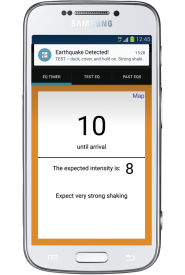Mobile app would bring earthquake early warning to all
In a perfect world, we’d all be as prepared for an earthquake as Jennifer Strauss.

In a perfect world, we’d also have an early-warning system to give us vital seconds to protect ourselves and our family from harm when the shaking starts.
In an article in the current issue of Earth magazine, Strauss, the external affairs officer for the Berkeley Seismological Laboratory, describes how an earthquake early-warning system would work in practice, beginning with the first blaring alarm from a cellphone: “Earthquake! Drop, cover and hold on! Strong shaking expected!”
“I grab my phone and run to my daughter’s room. The MyEEW app — an earthquake early-warning app released by our research team at the Berkeley Seismological Laboratory — is glowing bright orange: shaking intensity 8,” she writes. “We have 10 seconds until the shaking begins. Luckily, we have practiced this drill countless times at home. Muscle memory is the only thing keeping me centered while my thoughts race.”
In this hypothetical scenario, she and her family huddle under a sturdy kitchen table and escape injury as pictures fall, glass breaks and the lights go out. Her experience could be the norm, she writes:
“In the following hours we find that although there is substantial damage to infrastructure — broken water pipes, downed transformers, facades fallen from historic buildings — there is also expected damage that is somehow missing. There are no people trapped in elevators, no derailed trains. Hospitals report very few head injuries from falling objects. It will be weeks until people digest what exactly happened in the aftermath of this long-expected earthquake, but early warning will have played its part in reducing the danger.”
Strauss works with scientists, emergency response groups, legislators, private-sector businesses and the media as a part of an Earthquake Early Warning project that aims to make such a statewide system reality. She is now beta-testing a mobile app that could alert everyone in the case of an earthquake and let them know how many seconds they have to prepare for arrival of the ground shaking, whether that is to duck and cover, slow BART trains or switch off utilities.
“The good news for people on the U.S. West Coast is that earthquake early warning (EEW) is making progress along the path from being a good idea to becoming reality — hopefully, it will be a reality before the next major earthquake,” she writes.
To read Strauss’s article about how UC Berkeley and other universities are working with the state and the U.S. Geological Survey to institute a reliable early-warning system, link to the Earth magazine article.
